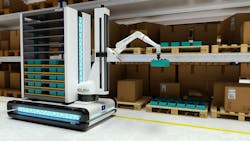Japan's "2024 Problem" and Why Robots are the Answer
Japan faces a labor shortage impact in 2024 as new overtime regulations for truck drivers come into force. This is being called the '2024 problem'. The world´s number one robot manufacturing country is developing automation strategies that will not only target logistical issues but also a wide range of industry challenges the new working time legislation will cause.
“The government's overtime cap is an important step to improve working conditions for employees,” says Takayuki Ito, Vice President of the International Federation of Robotics. “Industrial and service robots deliver great solutions to automate. Robots relieve workers of dirty, dull, and dangerous work and help to close productivity gaps.”
In Japan, the average annual working hours for a heavy truck driver were 2,568, which is 444 hours longer than the national average for all jobs—labor ministry data from 2022 reveal. Placing cargo in and out of trucks and warehouses is one of the most time-consuming tasks of truck drivers. Mobile robot solutions in transportation and logistics can help. To free up truck drivers from loading and unloading cargo saves them up to 25% of working time during a day´s shift. Robots also help reduce errors in order fulfillment by automating repetitive tasks such as picking and packing.
Warehouse robots in use today range from compact autonomous mobile robots to large-scale automated storage and retrieval systems. Their use reduces the amount of time required to move goods and they can handle heavy loads and dangerous materials without putting human workers at risk.
The benefits of robots for transportation and logistics are documented by latest statistics: on a global scale, more professional service robots were built for the transportation of goods or cargo than for any other function. Sales grew by 44% with more than 86,000 units sold in 2022 worldwide, IFR reports.
“Regulations of overtime work and the demographic change will require the adoption of automation technology in many branches of the Japanese economy,” says Takayuki Ito. “The challenges of the trucking industry are good examples to show how robotics and automation deliver adequate solutions for our workplaces of the future.”
The International Federation of Robotics is the voice of the global robotics industry. IFR represents national robot associations, academia, and manufacturers of industrial and service robots from over twenty countries: www.ifr.org
